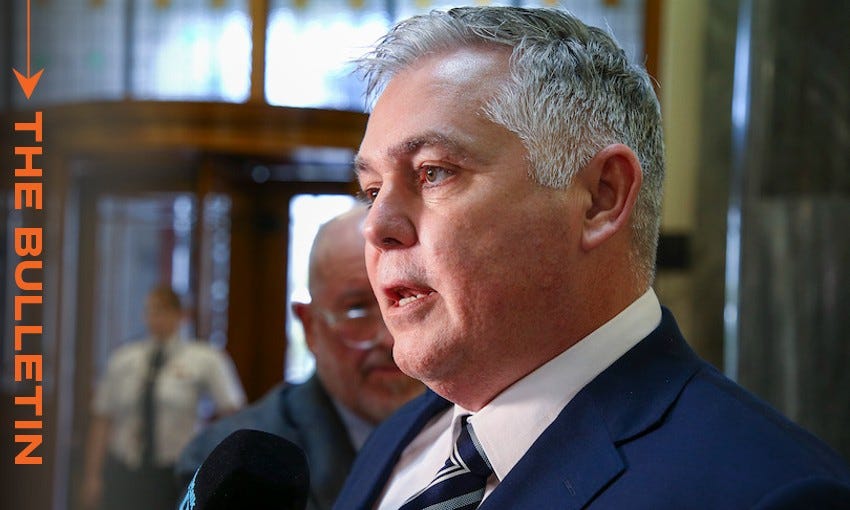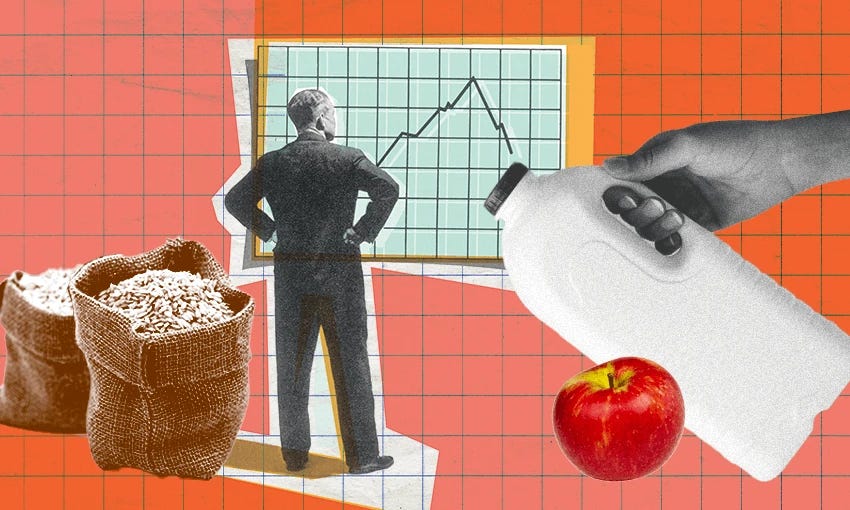Messy press conference prompts correction over Corrections funding
It took a post-post-cabinet statement to confirm that 810 new beds will be built at Waikeria.
Mōrena, and welcome to The Bulletin for Tuesday, May 7.
In today’s edition: A new report shines a light on the state of the economy, the MP also earning a councillor’s income, and doctors walk off the job. But first, how a good news story for the government was overshadowed by a shambolic press conference.
‘A shambles of missing numbers’
We’re just a few weeks out from budget day, which means the focus on the economy is especially heightened. As is the focus on numbers, of which the government appeared to struggle with during a particularly messy post-cabinet press conference last night. What should have been a fairly straightforward pre-budget announcement about support for Corrections instead drew headlines – like this from Newshub – focusing on the government’s “worst performance” at a press conference. “Journalists left there confused – worried about what to report because nothing was clear and in fact, nothing they said was right,” said Jenna Lynch on last night’s 6pm bulletin. Stuff’s Tova O’Brien was slightly more generous, labelling it “confounding”. The Spinoff’s Joel MacManus was there too, and told me as much. “It was a relatively simple announcement that turned into a shambles of missing numbers, unclear funding, and recycled campaign rhetoric,” he says. So what happened?
A billion dollar boost
Restoring law and order was a key pillar of National’s election campaign, so they’ll be kicking themselves that some of the attention has been on the delivery of the announcement, and not the announcement itself. The Herald has the key details. In short, Corrections minister Mark Mitchell confirmed a $1.9 billion boost for his agency. Of that, $442m comes from cost savings identified by Corrections as part of the government’s efforts to find “back office” savings in the public service. The remaining $1.5b was new money.
Mitchell said the funding would ensure the government could deliver an 810-bed extension to Waikeria Prison, along with 685 new Corrections staff. But that’s where things got confusing, as both Mitchell and the prime minister struggled to accurately articulate what was “new”, and how much had already been pledged by the previous Labour government. The Post’s Anna Whyte and Thomas Manch reported that confusions over the number of new beds “dominated the announcement”. RNZ’s Jo Moir and Craig McCulloch said Luxon and Mitchell contradicted themselves when trying to explain the correct details. One area the pair handled well: Getting rid of slushy machines was a “low priority”.
A Corrections correction, and where the confusion lay
Opening Morning Report today, Corin Dann said they’ll “try to get to the bottom” of the new announcement. Let’s do the same. In 2016, the last National government pledged 1,500 beds would be built at Waikeria. In 2018, then corrections minister Kelvin Davis said the Labour government would instead build a new 500-bed high-security prison, with an attached 100-bed mental health unit (so 600 beds all up). Many watching along yesterday would have been left with the impression that yesterday’s announcement falls somewhere in the middle, with the government boosting Labour’s plan by 200-ish beds. Instead, as a statement sent through to media from the government later clarified, there will indeed be 800 new beds, with Waikeria to boast capacity of 1,865 beds all up by the time the extension’s been completed. What went wrong? There were simply “a lot of numbers” in the ministers’ heads, a Beehive source told Tova O’Brien.
While we’re talking budget, AAP’s Ben McKay has comments from Nicola Willis confirming there will be a boost for both defence and foreign affairs on May 30. As he notes, that’s sure to please our international allies.
State of the economy in the spotlight
Yesterday’s pre-budget announcement came shortly after the government was praised for its cost saving drive – and issued some warnings. A new biennial report from the OECD was released, highlighting the state of the economy. It’s timing is unfortunate for the government, just weeks out from the budget, though there were few surprises. BusinessDesk (paywall) has the key details, reporting that the OECD put government spending over the last few years in the spotlight, noting that spending increases sometimes lacked a clear explanation. And it suggested creating a fully independent body to assess the cost of policy proposals from political parties. That’s an idea that is regularly floated, especially in the lead-up to elections, as this report from RNZ’s Craig McCulloch last year showcased.
Economist Shamubeel Eaqub told The Bulletin that the OECD’s recommendations boiled down to a request for “more consistent evidence-based policy – something that we struggle with very much”. So what could the government be doing?
Government urged to fully fund tax cuts
Two key findings were latched onto by the media. Crucially, ahead of budget day, the government was warned against borrowing to pay for its promised tax cuts, as the Herald’s Jenée Tibshraeny explains. Instead, any tax cuts should be “fully funded” and come from spending cuts or new revenue sources. Last month, finance minister Nicola Willis promised no extra borrowing would be needed to deliver tax cuts. While Willis welcomed the OECD’s insights on Monday, she said the government did not agree with every suggestion – one of those almost certainly being the call for a capital gains tax. The NBR has more on that here (paywalled), noting that a recent International Monetary Fund report also urged New Zealand to introduce a CGT. Asked about this in parliament last week, Willis said: “I can confirm there are three things that are certain in this world: death, taxes, and the IMF recommending a capital gains tax.” This piece from Interest.co.nz looks at the IMF and its “groundhog day” recommendation for a CGT. Politik’s Richard Harman examines how the OECD put Willis “between a rock and a hard place” here with some of its recommendations.
Another major suggestion, as explained by The Post, was to break up big businesses – including New Zealand’s supermarket duopoly. Eaqub told The Bulletin that this was a “big call”, though something that New Zealand’s done in the past such as for telecommunications. Willis told RNZ’s First Up today that the government was “very supportive” of market competition, and was keeping a close eye on it.
Finally, in other sad news for Big Supermarket, The Spinoff’s Joel MacManus explains how Foodstuffs lost a legal challenge to stop a new cycleway outside their store.
How the Student Volunteer Army is helping high schoolers give back
Thousands of students across Aotearoa are taking part in the Student Volunteer Association’s Service Awards, a programme focused on encouraging high school students for giving back to their community. AA Insurance and the Student Volunteer Army, have teamed up and together, have plans to grow these awards even further.
Read more about how the programme is helping students gain useful life skills on The Spinoff now, written in paid partnership with AA Insurance.
Doctors to walk off the job for the next day
Junior doctors begin a 25-hour strike this morning, RNZ reports, the first time they’ve walked off the job in five years. It was announced two weeks ago and as The Post’s Rachel Thomas reported (paywalled), it follows proposed pay cuts or a pay freeze for nearly 600 registrars – including 300 GPs – in 2025. Those in line for a cut include trainees in areas like radiation oncology, public health and psychiatry. Secretary of the Resident Doctors’ Association described Te Whatu Ora as “bonkers” for putting forward the 12% pay cut. “Why on earth would you present a pay cut to critical specialities?" she told RNZ. While Te Whatu Ora said that most of the country’s 2,500 doctors were in line for a pay increase of up to 25%, the doctors are striking for their colleagues set for a cut. Patients are advised that emergency rooms will remain open today and those in need will “receive safe care”.
It’s not just a domestic issue, by the way. Junior doctors in England are participating in a series of strikes over a pay dispute set to run until September.
NZ launches trade negotiations with the UAE
Trade minister Todd McClay has announced this morning that New Zealand and the United Arab Emirates will commence negotiations on a free trade deal. It follows a visit to Dubai, where McClay met with his UAE counterpart and discussed strengthening economic ties between our two nations. The Herald’s Thomas Coughlan has the details, calling trade talks “something of a consolation prize”. As he writes, the “big trade prize in the region” is a free trade agreement with the Gulf Co-operation Council of Saudi Arabia, United Arab Emirates, Qatar, Kuwait, Bahrain and Oman. Talks on this began back in 2007, wrapped in 2009 and were restarted in 2022. McClay says this agreement would “complement” the FTA effort with the Gulf Co-operation Council.
Join The Spinoff Members
“With a publication like the Spinoff, you never know quite what excellent journalism you will find. Complement this with the literary wizardry covering all manner of cultural topics, and you are contributing to a very fine publication indeed.” Julie, Spinoff Member since 2019.
If, like Julie, you enjoy our journalism and want to support us, please consider becoming a member today.
Click and Collect
NZ First MP Jamie Arbuckle is keeping his job as a councillor, and pocketing both salaries. (For more on Arbuckle and his two jobs, here’s a report from last year that’s worth a read.)
Journalist Chris Schulz, who routinely pumps out excellent reads on pop culture and music on his Substack, lays out the case for why Auckland's “great stadium debate” is silly and stupid. There’s more on this from The Detail too.
Following on from yesterday’s story about political donations, Newsroom’s Laura Walters analyses the case for a cap on how much donors can give.
Julie Anne Genter is back at work this week. Except, she’s in the Chatham Islands. As 1News notes, that means she’s unlikely to face the media over allegations of intimidation until next week.
Newshub’s Samantha Hayes is expected to host the new look Stuff-Three bulletin when it launches in July.
The Spinoff is looking for a new staff writer – could it be you?
Shanti Mathias presents eight fascinating graphs that show how our food system is entwined with the rest of the world. Ellen Rykers considers the climate cost of your digital life. Fran Barclay tries to replace his personality with the Meta AI chatbot. Tense office dynamics draining your soul? An anonymous public servant has some ideas that could help – from the kink community. And here's the best of movies and TV new to streaming services this week.
What you should be reading
The Spinoff’s senior editor and feature writer Madeleine Holden tells you what to include on your reading list.
Our big hits on The Spinoff this past week were a hilarious experiential feature on cooking with dog food and the case for why co-housing is a great idea, even though the author's project failed. They're both great reads if you missed them, but the deep cut you need in your life is Dan Carter won’t stop kicking. I have zero interest in sport, but that's no hindrance to enjoying this very funny, absurd and ultimately sweet story by Calum Henderson about attending the Beat Dan Carter challenge, and realising how much the former All Black "really, really, really loves kicking."
As far as international features go, all of my attention and remaining brain cells have been focused on the electrifying Kendrick vs. Drake beef, on which this Ringer analysis is the most interesting thing I've read that isn't a Genius lyrics annotation. From a little earlier in the year, I can't recommend this (sadly now paywalled) Sam Kriss review-cum-essay on drugs enough.
That’s it for today, thanks for reading. I’ll be back tomorrow.
Got some feedback about The Bulletin, or anything in the news? Get in touch with me at thebulletin@thespinoff.co.nz.
If you liked what you read today, share The Bulletin with friends, family and colleagues.
















Apart from the incompetence of the current Triad-Triumvurate-3 headed monster in understanding their own portfolios & policies sufficient to be able to communicate to their employers, we-the electors, money building prison beds would be more cost-efficient if spent on PREVENTING the need for more beds - once you build them you have to staff them & maintain them, and pay so much more a year for each prisoner than it would cost to say pay that person the $$$ NOT to commit crime! (I'm kinda joking, but???)
Start with the idiocy of cutting $$ support to adults so that they can't adequately feed & clothe their children leads to.....????? (No points for guessing adults might turn to crime, but also their children who are bombarded hourly with all the "stuff" (on top of basic food) they SHOULD have if they are to be "normal", but no way their parents can afford.) There have been successful programmes all around the world as well as Aotearoa where it is cost-effective to act like the local GP rather than the ambulance at the bottom of the cliff, so minors can be less likely to end up in a prison bed - just sayin'
Govt in nz has proven over the last decade to be puppets waiting for orders from a hidden authority